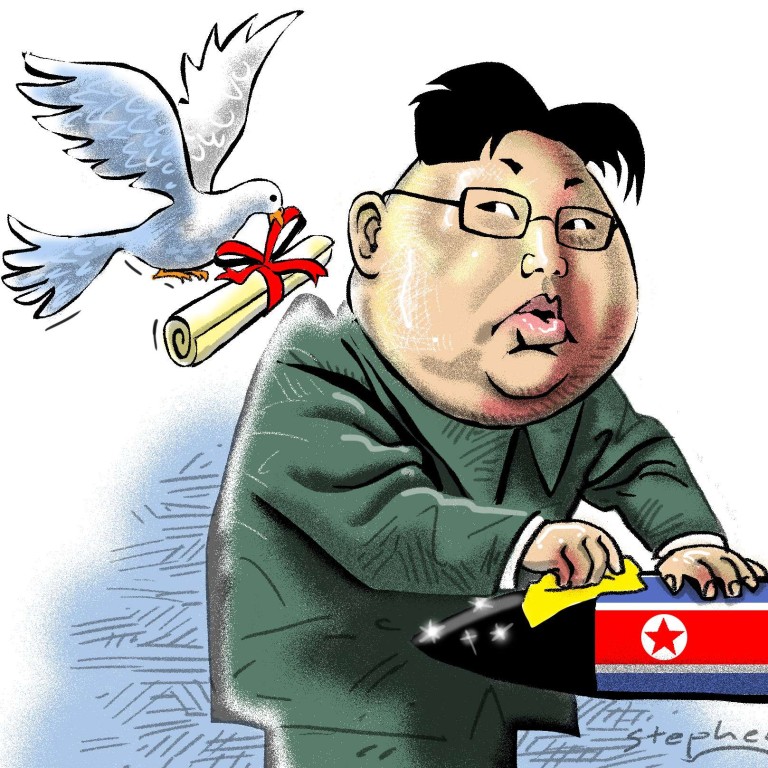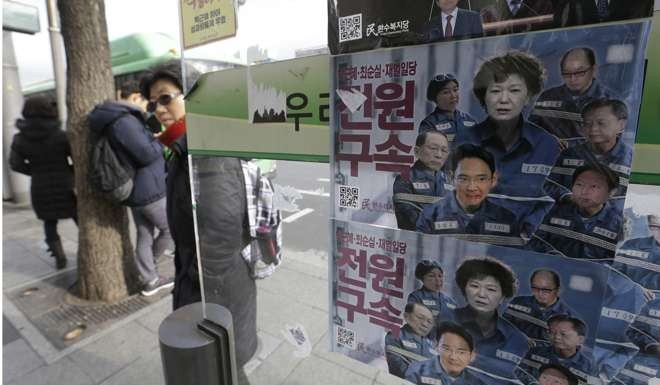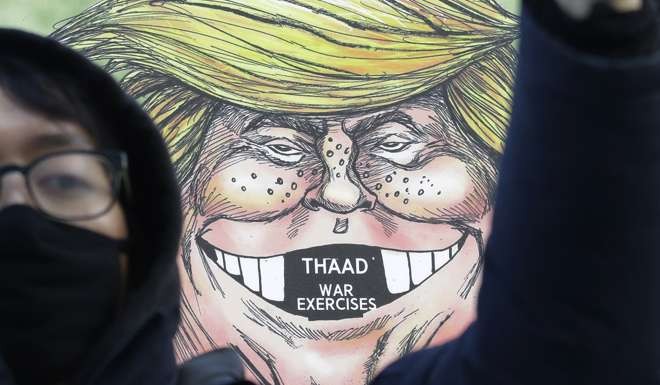
Why Trump should give nuclear-armed North Korea a shot at peace
Jerome A. Cohen and Edward J. Baker urge the US and other stakeholders to work on a peace treaty with the North to formally end the Korean War and avoid any dire fallout of Kim Jong-un’s rising nuclear rhetoric

He said he would continue to bolster the programmes as long as the United States remained hostile and continued its joint military exercises with South Korea. Perhaps most importantly, he said: “We have reached the final stage in preparations to test-launch an intercontinental ballistic rocket.”
In response, then US president-elect Donald Trump tweeted: “North Korea just stated that it is in the final stages of developing a nuclear weapon capable of reaching parts of the US. It won’t happen!”
It is not clear whether North Korea will be able to test an intercontinental ballistic missile (ICBM) this year and whether it has succeeded in miniaturising a nuclear warhead that can be placed on such a missile. In time, however, North Korea will succeed in those efforts.
Should North Korea implode, Beijing could face a dual crisis
To date, UN Security Council sanctions, even though approved by China and Russia, have not prevented the North from making progress in nuclear weapon and ballistic missile technology. Sanctions could certainly be made stronger and, if strictly enforced, especially by China, might prevent further progress.
Yet China and/or Russia might veto stricter sanctions and, even if they do not, that may take more time than it will for the North to ready a nuclear-armed ICBM. More importantly, China will not enforce sanctions strictly enough to halt Pyongyang’s nuclear and missile development, since that would risk the collapse of North Korea.
Should North Korea implode, Beijing could face a dual crisis: North Korean refugees flooding China, and South Korean and US troops on its northeastern border. China’s consistent position has been that the way to settle this problem is by negotiations between the US and North Korea.

US still backs Korean missile shield, Pentagon chief says
Also, what does Trump mean by, “It won’t happen”? Does he think he can cajole China into putting sufficient pressure on the North? Even if it does not mean that he intends to prevent an ICBM test by force, once US intelligence believes the North has developed such a missile, many in Washington will urge a pre-emptive strike against the North’s nuclear and missile facilities. Indeed, pressure in Congress is rising.
What does Trump mean by ‘It won’t happen’? Does he think he can cajole China into putting sufficient pressure on the North?
It is difficult to predict whether such a strike might succeed. If the US launches or even appears to be about to launch such a strike, North Korea can retaliate against the South, perhaps firing hundreds of artillery tubes it has aimed at Seoul.
Does the US have an alternative to waiting for North Korea to develop a nuclear-armed ICBM and then taking military action against it?
Some are relying on the deployment of the THAAD (Terminal High Altitude Area Defence) in South Korea. China adamantly opposes this because Beijing believes THAAD would be aimed at it. The US Defence Department’s assurances that THAAD would be aimed solely at North Korean missiles have not comforted China.

Since then, for other reasons, protests against Park reached the point that the National Assembly impeached her on December 9.
Yet, current US Secretary of Defence James Mattis and his South Korean counterpart have increased the urgency of the issue by agreeing that THAAD deployment should be completed by the year’s end.

South Korea: no delay for THAAD missile deployment, despite Beijing’s objections
We believe that offering to enter negotiations with North Korea for a peace treaty to formally end the Korean War is an alternative worth trying. Last June, Trump said on the campaign trail that he would welcome Kim to the US for talks. We urge that such talks be held and focus on a comprehensive peace settlement.
For many years, the North has advocated negotiations for a peace treaty, and it should welcome unconditional, exploratory talks
North Korea has refused to enter into negotiations that are conditioned on its giving up nuclear weapons or undertaken for the purpose of bringing about that result. However, for many years, the North has advocated negotiations for a peace treaty, and it should welcome unconditional, exploratory talks.
Short of a disastrous war, we believe that the only way to possibly bring about a nuclear-free Korean peninsula is as part of a comprehensive peace treaty.
Given the history of conflict between the US and North Korea, such negotiations will be very difficult. Yet, if they fail, we will be back where we are now, but no worse off.
If they succeed, the prospect of a deliberately or accidentally launched war of mass destruction in Northeast Asia will be greatly diminished, to the benefit of all.
In recent years, the US has made progress in defusing strained relations with Cuba, Iran and Myanmar – as Richard Nixon did with China and Bill Clinton with Vietnam. President Trump could do the same with the even more urgent problem of North Korea. After more than six decades, it is time for a new approach.
Jerome A. Cohen is faculty director of NYU’s US-Asia Law Institute and adjunct senior fellow for Asia at the Council on Foreign Relations. Edward J. Baker, retired associate director of the Harvard-Yenching Institute, is a special adviser to the Harvard Korea Institute

